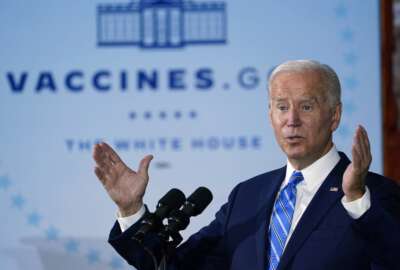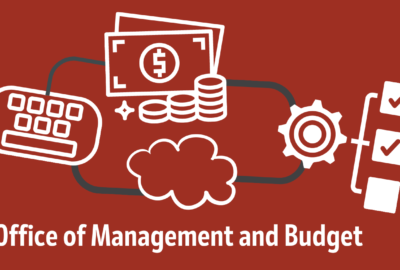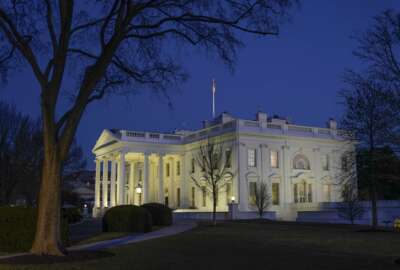OMB seeking feedback on first-ever PMA learning agenda
The Office of Management and Budget will launch its first-ever learning agenda for the president's management priorities. It's soliciting feedback from academics,...
Best listening experience is on Chrome, Firefox or Safari. Subscribe to Federal Drive’s daily audio interviews on Apple Podcasts or PodcastOne.
The Office of Management and Budget is soliciting feedback on a draft learning agenda for the president’s broad management priorities, the first of its kind for the federal government.
The draft learning agenda, which the Office of Management and Budget launched Tuesday, is supposed to identify gaps and potential research questions that will advance the three broad priorities detailed in the President’s Management Agenda.
“President Biden is committed to ensuring an equitable, effective and accountable government that delivers results for all,” Pam Coleman, associate director of performance and personnel management at OMB, said in a statement. “The draft learning agenda released today provides a framework for asking the necessary questions needed to make the president’s ambitions a reality. We are calling on researchers, public servants and private citizens for their feedback, expertise and guidance to build the research and evidence needed to solve the most pressing problems facing the federal government.”
OMB said the feedback it receives will shape the final version of its PMA learning agenda.
Federal employees, researchers and members of the public have until Jan. 31 to submit their feedback through a survey form on Performance.gov. OMB framed the questions within the context of the federal government but said it wants feedback from members of state, local and tribal governments, as well as the private sector.
In general, learning agendas have taken on a more prominent part of the federal government’s dialogue in recent years, as agencies move toward using evidence to inform budget and decision making. Individual agencies are crafting their own learning agendas, which will become public sometime next spring, OMB said.
Those learning agendas are supposed to outline key questions, research and evidence as a way to describe how agencies will tackle their biggest problems. They’re also a requirement under the 2018 Foundations for Evidence-Based Policymaking Act.
The concept of a PMA learning agenda, however, is a novel one, OMB said. Ultimately, the Biden administration said it hopes a PMA-focused learning agenda will spur research and innovation both in and outside government and help agencies collaborate on common problems.
“Many of the most pressing issues do not fit neatly within the boundaries of a single agency,” the draft agenda reads. “This PMA learning agenda provides an opportunity to coordinate learning and evidence-building across agencies by applying an efficient, whole-of-government approach.”
The Biden administration recently unveiled three broad strategies for its PMA, which include strengthening the federal workforce, delivering secure and equitable customer service and managing the business of government. Naturally, the draft learning agenda focuses on those three areas and includes a range of questions designed spark research and evidence on each topic.
When it comes to strengthening the federal workforce, the Biden administration is interested in everything from finding the best hiring assessments to screen for top talent, to choosing reskilling and upskilling strategies for federal employees.
“The Biden-Harris administration wants the federal government to be a model employer, operated by a talented, diverse, and engaged workforce,” the draft learning agenda reads. “What are effective strategies to hire, retain, engage, and grow talent within the federal government? Many of these questions could leverage the recent workplace and hiring flexibilities that were implemented in response to the COVID-19 pandemic. New evidence on these questions could guide decisions at agencies and may also have relevance for employers and organizations beyond the federal government.”
To improve customer service, the Biden administration is soliciting feedback on many of the themes and ideas that the president detailed last week in a new executive order on customer experience.
It’s looking, for example, for advice on which approaches will work best in eliminating administrative burdens, particularly those that disproportionately impact members of the public from underrepresented communities.
The administration also questioned whether removing administrative burdens could have an impact on the government’s goal of reducing improper payments, and it’s seeking out feedback on the best methods to measure public trust.
“How do various touch points between a person and government services affect trust in government?” the draft learning agenda reads. “Is it speed (e.g., short hold times for a phone call), transparency (e.g., open data with accessible dashboards) or knowledgeable service (e.g., staff with expertise to solve a problem)? In those contexts, how do different modes or styles of communication (e.g., live chat, in person, over the phone) affect trust?”
Finally, the administration questioned how it can more equitably serve underrepresented communities. It wants feedback on what approaches work best in equitably dispersing grants, loans and other time-sensitive resources from the government, and it’s seeking ideas on tools, training and procurement structures that will advance equity.
Copyright © 2025 Federal News Network. All rights reserved. This website is not intended for users located within the European Economic Area.
Nicole Ogrysko is a reporter for Federal News Network focusing on the federal workforce and federal pay and benefits.
Follow @nogryskoWFED






